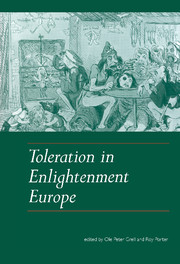Book contents
- Frontmatter
- Contents
- List of contributors
- Preface
- 1 Toleration in Enlightenment Europe
- 2 Toleration and the Enlightenment Movement
- 3 Multiculturalism and Ethnic Cleansing in the Enlightenment
- 4 Intolerance, the Virtue of Princes and Radicals
- 5 Spinoza, Locke and the Enlightenment Battle for Toleration
- 6 Toleration and Enlightenment in the Dutch Republic
- 7 Toleration and Citizenship in Enlightenment England: John Toland and the Naturalization of the Jews, 1714–1753
- 8 Citizenship and Religious Toleration in France
- 9 A Tolerant Society? Religious Toleration in the Holy Roman Empire, 1648–1806
- 10 Enlightenment in the Habsburg Monarchy: History of a Belated and Short-Lived Phenomenon
- 11 Toleration in Eastern Europe: the Dissident Question in Eighteenth-Century Poland–Lithuania
- 12 Toleration in Enlightenment Italy
- 13 Inquisition, Tolerance and Liberty in Eighteenth-Century Spain
- Index
13 - Inquisition, Tolerance and Liberty in Eighteenth-Century Spain
Published online by Cambridge University Press: 03 February 2010
- Frontmatter
- Contents
- List of contributors
- Preface
- 1 Toleration in Enlightenment Europe
- 2 Toleration and the Enlightenment Movement
- 3 Multiculturalism and Ethnic Cleansing in the Enlightenment
- 4 Intolerance, the Virtue of Princes and Radicals
- 5 Spinoza, Locke and the Enlightenment Battle for Toleration
- 6 Toleration and Enlightenment in the Dutch Republic
- 7 Toleration and Citizenship in Enlightenment England: John Toland and the Naturalization of the Jews, 1714–1753
- 8 Citizenship and Religious Toleration in France
- 9 A Tolerant Society? Religious Toleration in the Holy Roman Empire, 1648–1806
- 10 Enlightenment in the Habsburg Monarchy: History of a Belated and Short-Lived Phenomenon
- 11 Toleration in Eastern Europe: the Dissident Question in Eighteenth-Century Poland–Lithuania
- 12 Toleration in Enlightenment Italy
- 13 Inquisition, Tolerance and Liberty in Eighteenth-Century Spain
- Index
Summary
The Iberian world is peculiarly difficult to fit into a discussion of toleration, because there was in Iberian society no longer any pluralism of culture after the expulsions of the Jews (1492 from Spain, 1497 from Portugal) and the Muslims (1609–14), and therefore no problem of tolerance that might call for either new legislation or new intellectual concepts. The expulsions of these minorities were preceded in each case by impassioned discussions about the rights and wrongs of permitting (that is, tolerating) them within society; thereafter, quite obviously, toleration was not a major issue. But Spain cannot be written off in considering the matter, even though it is habitual to do so. Moreover, the case of Spain allows us to consider in general the interesting differences between northern and Mediterranean Europe, and the reasons for the total absence of toleration theory in the Mediterranean. Spain, Italy and associated states in the Mediterranean were, until the twentieth century, in the forefront of the perennial war against Islamic Africa, a fact that has often been offered as an explanation of Spain's aggressive stance towards non-Christian faiths. Yet there was also a perennial war against Islam in Transylvania and associated border states, which managed none the less to accept some toleration in the sixteenth century; and Italy for long periods tolerated its Jews in a way that the Spaniards since 1492 considered impossible. The Spanish case, evidently, is not easy to explain.
We may consider at least three main aspects of Spanish attitudes in the eighteenth century: retrospective reflections on the country's historical experience; new philosophical approaches; and appreciations of foreign thought.
- Type
- Chapter
- Information
- Toleration in Enlightenment Europe , pp. 250 - 258Publisher: Cambridge University PressPrint publication year: 1999

